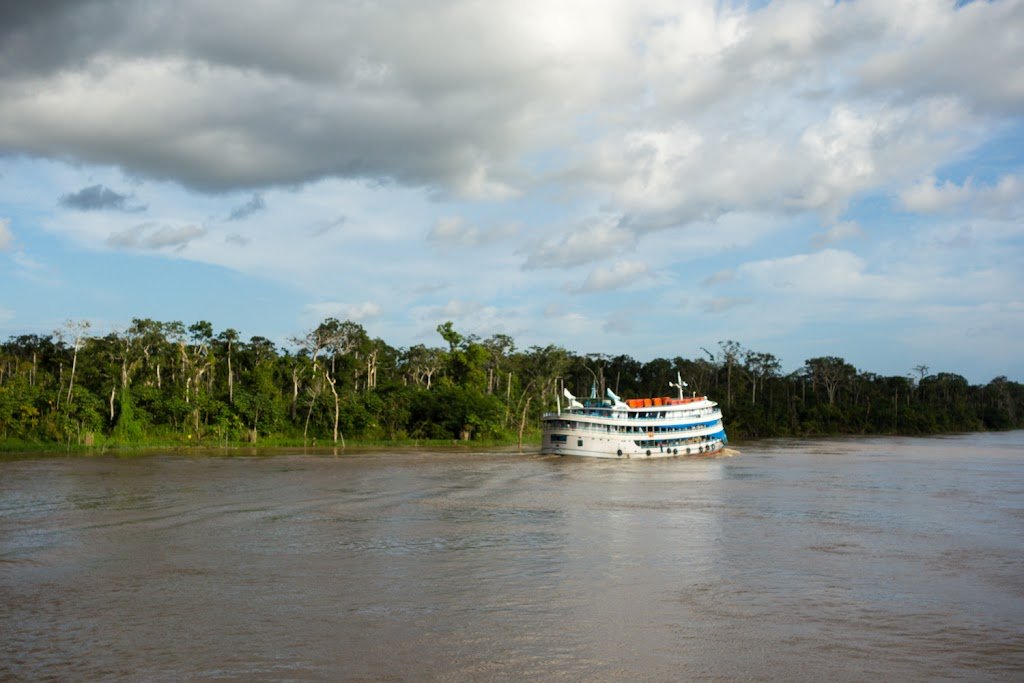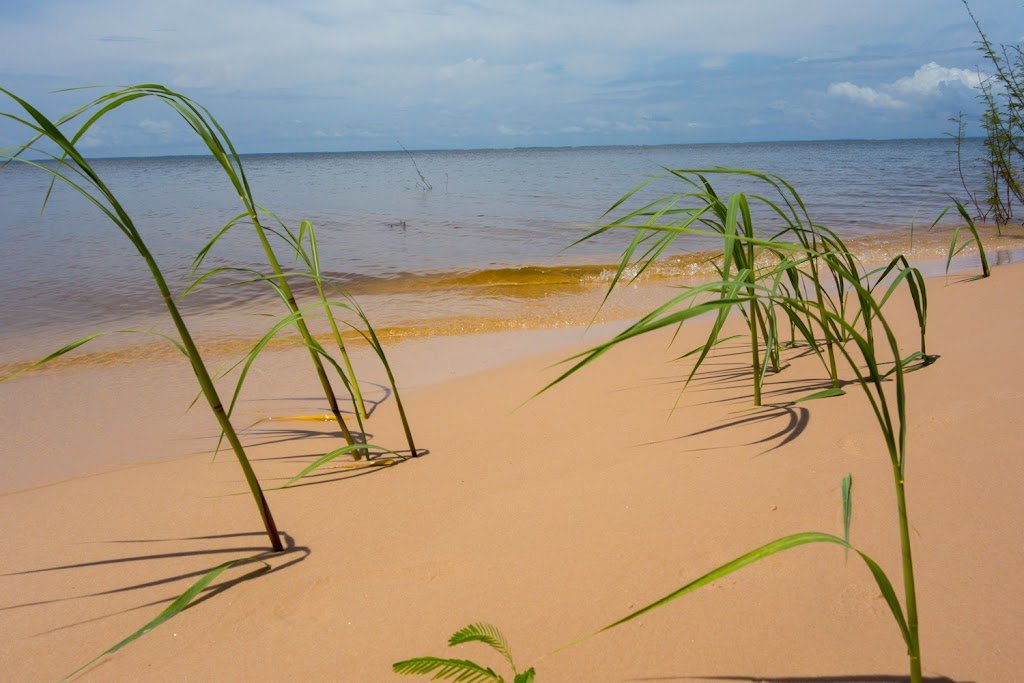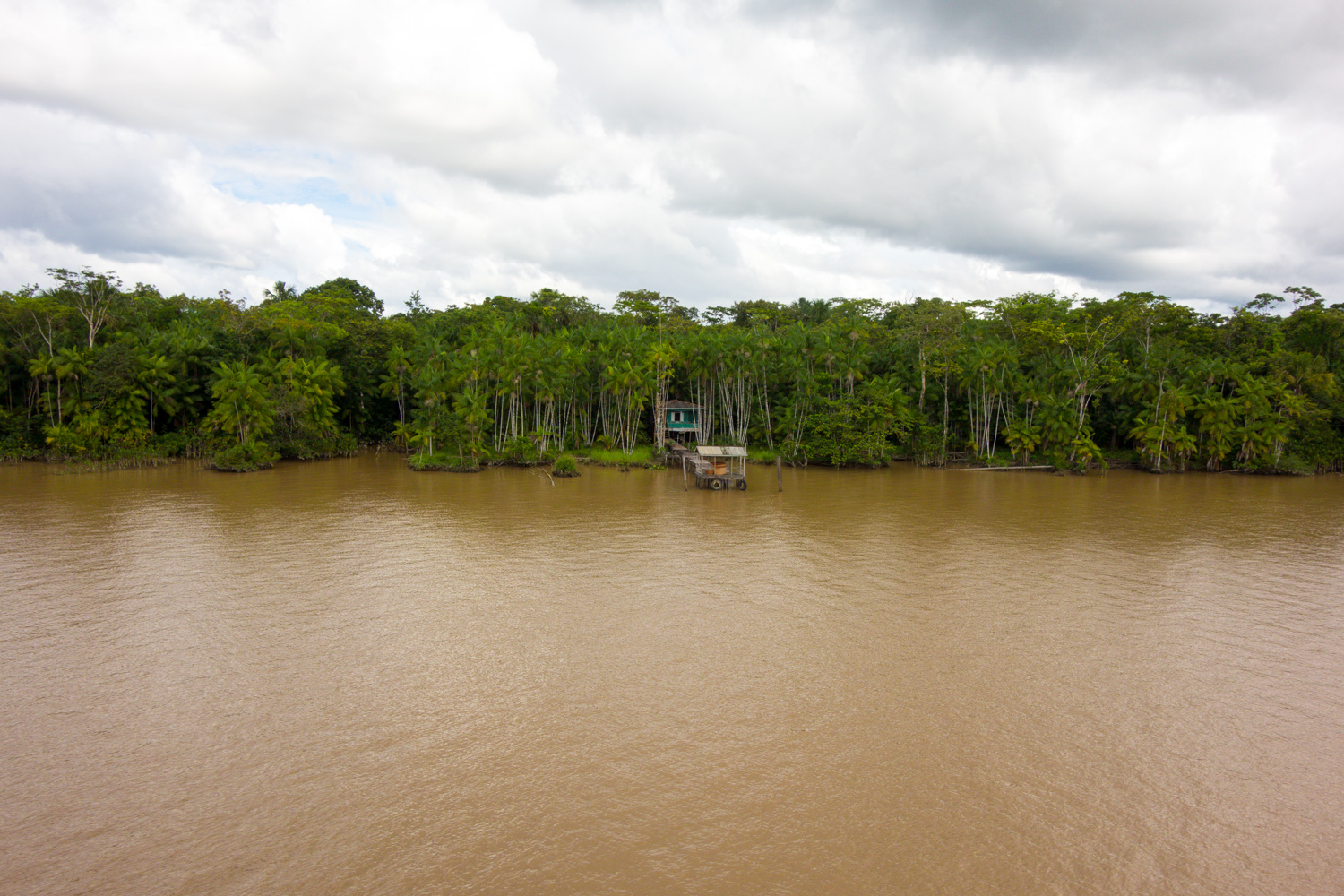Sometimes I get asked questions about our travel style. Loyal readers might recall our Trans Siberian adventure, yet let me recount another epic voyage to prove that we prefer elite/business/executive class to third class😜 We don’t feel comfortable if we don’t share a space with locals, and in this case, an estimated 800 people on hammocks sharing a deck onboard Amazon Star, one of the many slow boat lines operating on the Brazilian Amazon River.

The Amazon River is unimaginably wide and sailing along this humongous waterway for thousands of kilometers by slow boat is a unique, documentary-like experience. Watching life on the Amazon pass by while swinging in a hammock on deck, getting intimate with the rich ecosystem of the Amazon basin and the communities that live on the banks of the river, relaxing on white-sand beaches, watching pink dolphins play, meeting the Meeting of the Waters, attempting to keep the deck dry from the pouring rain with a plastic tarp, and more…all that is the unique kind of adventure awaits you cruising down the Amazon.

The Amazon River cuts across South America making its way through three different countries: Brazil, Colombia, and Peru. As the main mode of transportation, slow boats cover various routes on the Amazon River. Basically, you could travel all the way from Peru (Iquitos / Santa Rosa) to Colombia (Leticia) and then continue downstream in Brazil (Tabatinga) until you reach the Atlantic Ocean east of Belém. While there are luxury cruises catering to tourists, the slow boats are not for sightseeing; they are the long-distance buses of the Amazon jungle connecting the major settlements along the world’s largest river by volume.
A slow boat is basically a ferry that can transport both passengers and freight on the river. The boats are at least half a century old in varying quality and shape, so don’t expect any fanciness. Apart from hammock spaces, they also come with some cabins and suites but trust me you’d prefer a prison cell over a cabin on these boats. So, sleeping in a hammock is the way to go, and believe it or not, it sleeps super comfortably.
To end our epic year 2018 with an epic journey, Tom and I traveled a total of roughly 3300 km / 2000 miles over 150 hours between the Brazilian cities of Tabatinga and Belém on three different trips. Truly an epic voyage that takes about 7 days in total if you don’t break up the journey, but we opted for stopping in Manaus and Santarém along the way to take tours deeper into the jungle.

A journey on slow boats is certainly not for everyone, but those who can forgo higher comfort levels will have the opportunity to experience something extraordinary.
Ready to embark on an adventurous trip? Here are my tips to help you plan your very own Amazon sailing adventure.
How to Travel the Amazon River by Slow Boat
Selecting the Route on the Amazon River Basin
The first thing you need to decide is where to fly in the Amazon basin, that’s Iquitos in Peru or Leticia in Colombia. As for Brazil, you’ll have more options: Manaus, Santarém, Belém.
You can travel in either direction, but keep in mind that traveling upstream takes longer than downstream, and you should add a 2-3 days buffer to allow for delays and missed connections. Needless to say, you can cut the journey short by doing some legs by boat, and others by plane. Remember there are also fast boats on some routes, but they literally resemble a bus. Compared to slow boats, the fast boat isn’t quite as atmospheric or scenic. If you’re looking for a more comfortable way without flying, the fast boat is what you need.
If you start in Iquitos, Peru, you can take a fast boat or slow boat to Santa Rosa which would take anywhere from 12 hours to 2½ days. From Santa Rosa (Peru) you can cross into Colombia, which is just a 5-minute boat ride away. Remember to get your exit stamp from Peru before entering Colombia or Brazil.
You can freely move within a radius of 80 km in Tres Fronteras (tri-border), there are no border posts, but if you don’t intend to return to the same country, you need to get your exit stamp, as well as an entry stamp from your next destination. You should deal with the bureaucracy a day before the boat departure at the latest.
Roughly two-thirds of the Amazon River and by far the largest portion of its basin lie within Brazil. As you might remember from this post about Tres Fronteras, in order to grasp the immense size of the Amazon rainforest, we walked from Leticia to Tabatinga and bought tickets to Manaus departing within two days. During our entire Amazon journey, we would always go to the port and buy tickets for the next scheduled boat at the ticket office, no need to book in advance.

Recommendation for the best route for the Amazon River Cruise
For the sake of convenience, here is a short summary of the routes we traveled by slow boat.
- Tabatinga to Manaus: 72 hours (3 days and nights), food was included in the ticket price, and the boat had open-deck hammock space
- Manaus to Santarém: 30 hours (the shortest leg with only 1 night onboard), food wasn’t included except drinking water, and hammock space was semi-open. This section of the river was densely populated by humans, hence with much fewer trees than in the first section. Many tourists who are short on time, prefer to travel only this section, as you can fly into Manaus and fly out from Santarém and the journey is relatively short. But, in my opinion, it was the least interesting of all three sections.
- Santarém-Belém: 48 hours (2 nights onboard), food was not included in the price, and the hammock space was closed. It’s worth noting that the boats depart only from Friday to Sunday in Santarém.
In my humble opinion, the most rewarding section of the journey on the Amazon River was from Santarém to Belém, where you can see the famous Meeting of the Waters, pink and grey dolphins, visit the Caribbean of the Amazon (Alter do Chão, just a 30-minute drive from Santarém), and generally observe the life on Amazon basin like hitchhiker or beggar-tribe boats (more on this later). This route travels both on the main channel of the Amazon River and smaller backwaters, thus more scenic. Besides, 48 hours aboard is the optimum amount of time to balance the experience without getting bored.

However, if you are short on time, you may want to fly into Manaus and fly out of Santarém after spending a couple of nights in Alter do Chão. This would give you a taste of slow boat travel and take in some of the highlights without spending too much time on the boat. Yet again, I found the Manaus-Santarém section of the river the least interesting of all three. If you have a little longer time, I would highly recommend you fly into Santarém and fly out of Belém, or even São Luís after visiting the stunningly beautiful Lençóis Maranhenses National Park.
Oh, just you know: don’t expect punctuality and accept you cannot plan in detail ahead of time. Nevertheless, don’t let the uncertainty scare you away. the logistics of this boat trip are not that difficult to handle even for the casual traveler.
What to Expect on the Boat
The boats vary in shape and quality, and we didn’t get to experience all the ferries operating on the Amazon River, but most are similar (old, rusty, and run-down) so this will give you a general idea of what to expect.
Safety
First things first, in our experience, we had no safety concerns while traveling by slow boats. That being said, always use common sense. For example, I would always take the daypack with our electronics into my hammock and cuddle it during the night. Daytime, we could take turns when using the bathroom or so. Speaking of electronics, there is a limited number of outlets to charge your devices, you’ll need to share them with hundreds but it works.
Food
On our trip from Tabatinga to Manaus, 3 meals per day were included in the price, as well as unlimited cold drinking water and coffee. Remember this is not a luxury cruise ship, and considering the circumstances the food was tasty, however, having the same meal over and over again gets a little boring. So I would recommend bringing your own food supplies too.
For the remaining legs of our journey, food was served on the boat, but it was not included in the price of our tickets. The drinking water was always free, all the boats had potable cold water. There was also a small kiosk selling soft drinks, beers, instant noodle cups, and other snacks.

Cleanliness
Ok, this one is a bit objective. As a slightly obsessive-compulsive person, I found the situation not as bad as I thought. The bathrooms were cleaned often, there was always toilet paper (still bring a roll with you just in case), and there were showers as well so you could keep yourself fresh on the boat.
You must know that the water for WC and shower is taken from the Amazon River, so it has a brownish color. Thus, the toilet might appear dirty at first glance. But in fact, with a high probability, it’s so due to the color of the river, not because it’s been left dirty. This was at least my experience as a female. But Tom had a rather traumatic experience, and he could barely handle it. Apparently, too many drunken men missed the target and all sorts of things you might imagine. I must admit I could smell the stench of the bathroom whenever someone opened the door to the men’s bathroom area. And this brings us to our next topic.
Your Bed for the Journey
The boat does not supply you with a hammock, but don’t worry, they are easy to find. Hammocks are sold in the departing towns near the docks or market stalls for about $10 US including two pieces of rope (1.5m each) to tie the hammock.

It is possible to pay a lot more for a cabin on the boat, and on the route from Tabatinga to Manaus, we booked a cabin to be able to observe how everything works and to have some privacy for this 3-night-long journey. As mentioned before, the cabin was like a prison cell: dark, stale, windowless tiny room. It solely had a bunk bed, an AC, and a private bathroom. I rather felt envious of the people swaying in their hammocks on the open-air deck enjoying the nice breeze and the scenery. So, for the remaining sections of the journey, we didn’t make the same mistake again.
Before the trip, get to the pier as early as possible and get on the boat ideally as soon as it arrives. Try to pick a good spot to hang your hammock, away from the sources of smells (toilet), and noise (bar/restaurant/boat engine/TV/stairs/sinks). I would recommend hanging the hammock low so that you can use the space beneath your butt to store your luggage. This way you would always feel it. It’s good to know that people might even hang hammocks above yours if the boat is too crowded, though we didn’t have to experience it. If you cannot figure out how to tie and secure the hammock, just ask someone. People will help you.

Speaking of people, the majority of the passengers were locals. We met a few travelers from Europe on their annual vacation, and a few backpackers from Argentina, who were literally camping on the boat (check this clip out: https://youtu.be/h5NH2iv4r2s ).


Day in, Day out Life on the Boat
What is there to do on a boat on the Amazon River? Well, a whole lot of nothing. You basically lie in your hammock for a couple of days staring at the river. But that’s the best part! You can simply relax, read a book, watch movies, play cards, chat with your travel companions, catch up on your sleep, and enjoy the ride as you slowly pass small villages, wooden huts, lush forests, and spectacular orange and lavender sunsets.




While the muddy expanse of the vast Amazon River drifted by, I truly enjoyed not having to make any plans for a couple of days. Here is a glimpse of our day-in, day-out views in motion: https://youtu.be/IzI7inBNmHk
Highlights of Our Trip on the Amazon River
Meeting of the Waters
Amazon River has many tributaries, as such you’ll encounter the so-called phenomenon “Meeting of the Waters” in several spots while cruising on the Amazon. Most of these spots are not mentioned in any guidebook, possibly not even pinned on any map.

The most famous one of the “Meeting of the Waters” is about 15 km before Manaus, where the white Solimões River meets the black Rio Negro. The density of these two rivers is so different that they never mix and run next to each other for a couple of kilometers. Another place where you can observe the Meeting of the Watersis Santarém. The milky brown Amazon and greenish Tapajós rivers continue flowing for miles side by side, a spectacle that can be clearly seen by the naked eye. As for others, you just need to get on deck and watch the scenery passing by.



River Dolphins, sloths, birds, iguanas, and more
The Amazon River is absolutely enormous, and the boat often cruises far from shore, but when it rides close to the jungle, especially when approaching the settlements, remember to stare into the greenery harder, you might spot the local creatures like birds or river dolphins. We indeed saw a few times pink and grey freshwater dolphins right at the dock of the villages. They are hard to capture though, but on the short boat tour in Santarém, I got them on camera.

If you have some time to kill in Santarém, the short boat tour from Santarém’s tourist port is highly recommended. It was quite a rewarding tour, even though we didn’t go deep into the jungle, we could observe several bird species, iguanas, and pink and grey river dolphins among others. Here is the clip: https://youtu.be/F4idaoyxrsY











Riverside beach town Alter do Chão
Namibia? The Caribbean? The Amazon basin is not all about rainforests. I had no idea that sandbanks, palm trees, pretty lakes, sand dunes, and beach towns along the river as touristy as any destination in the Caribbean are all part of this huge ecosystem. No wonder, the Amazon is called the “River Sea”.

Alter do Chão is a riverside beach town, also known as the Caribbean of the Amazon. And indeed, it’s as touristy as any destination in the Caribbean and it’s the ideal place to relax.



We spent four chillaxing days at this lovely beach town and took local tours to nearby places, just to find out more about this huge ecosystem.
















Glimpse into Local Tribes’ Life
The Santarém-Belém route followed the smaller backwaters on the second day, thus we were able to get a glimpse of some remote tribes of the Amazon. I personally felt like living in a documentary, my very own documentary, while watching the hitchhiker boats selling para nuts and shrimps to passengers, or beggar boats waiting for leftover food to be thrown, all from a comfortable spot on the deck.



Men, women, children…The tribespeople would wait for the ferries on their canoes and motorized vehicles by dozens. At the back of the boat, motorized speedboats zoom around us. Once they manage to tie themselves to the ferry, they board the ferry to sell their products (watch on YouTube: https://youtu.be/pouv4Gb3KHs).


We pass by a few wooden plank towns, small petrol stations, and churches, but in general, the land was pure unadulterated jungle until we get closer to Belém, the most civilized city of all.








Sampling Amazonian food
Once in the rich Amazonia, make sure to try some regional specialties. Here are some of the most common food you’ll encounter.







Final Thoughts on Travelling Amazon River by Slow Boat
So, this blog post wraps up our nearly three weeks spent in the Brazilian Amazon basin. We made it all the way from Tabatinga to Belém on slow boats, sharing a deck and a few bathrooms with an estimated 800-1000 passengers. In parts, it felt like a refugee boat that honestly made me appreciate the modern life amenities more, and I hear from many that they would never embark on such a journey again, including the hubby. As for me, the journey had all the trappings of an incredible adventure and I can imagine embarking on the 3000 km meander back to Manaus from Macapa, via the Guianas in the future.
How about you? Would you consider doing such a trip as well or would you rather say “No, thanks”?
Lastly, I’d like to share my favorite mural with the motto “We are the Amazon”. I love the amount of detail, but above all how perfectly the trunk blends in with the tree itself.

Viva Amazonia.








very helpful. will be doing this route in a few months. thank you
Wishing you an amazing journey! Happy travels!
Love the content and the information. I'm also living in Munich and looking to take the trip from Manaus to belem. If you have any additional content I would love to check it out! Thanks again!
I hope you'll have an epic trip! All content is wrapped up in this post, including links to Youtube videos. If you have any questions, or I forgot to mention something, I'd be happy to address them.
Hello…great post! Do you know here a boat that goes to Macapa from Santarem? There is little info on this on the web. Thanks
AFAIK, boats to Macapa arrive and depart from Praça Tiradentes near Santarem downtown (and actually they dock in Porto Santana, some 20 km away from Macapa). Old guide books say boats to Macapa depart daily at 6pm from Santarem and take about 36 hours, but I wouldn't rely on this information. Hope this helps and wishing you a great trip! Happy travels
we’re the mosquitoes bad..did you have vaccinations
In our experience while on the boat it wasn’t an issue, but on jungle tours there were enough mosquitos 🙂 there is no vaccination against mosquito-transmitted illnesses. We carried stand-by malaria medicine, thankfully not needed. I would recommend you consult a physician with respect to your individual medical condition and needs (which we did too before the trip). Happy travels.
Awesome blog . Thank You..I am doing this run in November Dec and january…5 weeks of sure exploration..this blog helps a hell of a lot..thank u
Thank you for your feedback! Sounds like an epic journey, wishing you a great adventure!
Maho+Tom, amazing journey and super helpful info, thank you!
Keith, I’m planning to take a boat from Macapá/Porto do Grego to Santarém March-April 2025. If given an opportunity when in Santarém, could you please ask the timings for that for me:D
Hello you! Thanks a lot for your report!! This is exactly what I’d like to do some time in 2025! I’d like to know though how much you’ve spent on the boats. For sure prices always rise but still it would be good to have an idea. Thank you and greetings from Berlin! Laura
Hi Laura, we travelled in early 2019, so I don’t really remember the prices but the shortest distance was probably something like 60-70 EUR pp for hammock space. The Tabatinga-Manaus one with the cabin was like 170 EUR I think. Generally transportation in Brazil is not cheap, the distances are very long. You may need to budget for some flights, and if you book early enough it can be better than taking a bus. Wishing you an amazing trip!
If you want to add to this experience start in Yurimaguas in Peru…to Iquitos…48hours on one of the Eduardo boats…..similar experience than described here……ready to share 2 toilets for 140people?, and eat chicken noodle soup lunch and dinner…and a very watery porridge for breakfast…..You can stop and disembark in Nauta, I did, and went on a jungle tour for 2 days ….before reaching Iquitos by van.
Anyone done a similar “cruise” on the Rio Napo in Ecuador? ( to Iquitos)